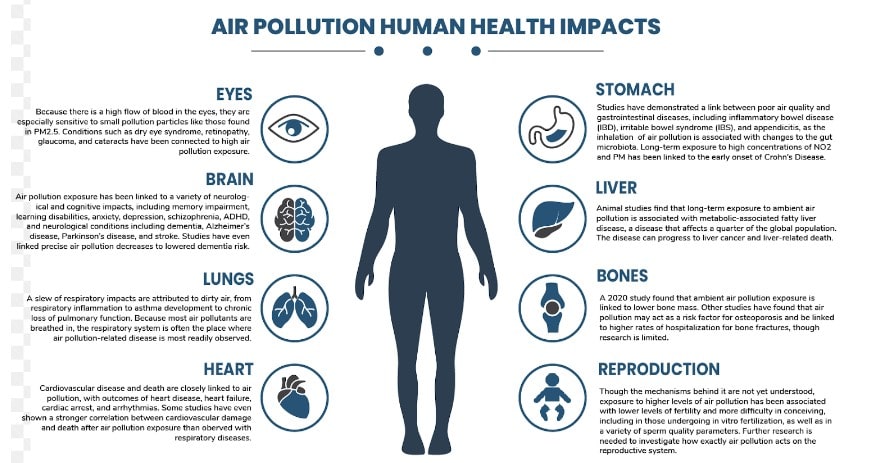Maintaining good air quality is essential not only for our physical health but also for our mental well-being. Poor air quality can have various adverse effects on our mood and overall mental health.
In this article, we will try to dig deep and delve into some studies and research behind the connection between poor air quality and mood, exploring how pollutants in the air can affect our emotional state.
Understanding the Link Between Air Quality and Mood:
Understanding Air Quality:
Air quality refers to the condition of the air around us, including the presence of pollutants such as particulate matter, volatile organic compounds (VOCs), carbon monoxide, and ozone.
These pollutants can originate from various sources, including vehicle emissions, industrial activities, and indoor sources such as cleaning products and building materials.
Effects of Poor Air Quality on Health:
Poor air quality is known to have detrimental effects on physical health , including respiratory problems, cardiovascular diseases, and even cancer.
, including respiratory problems, cardiovascular diseases, and even cancer.
However, emerging research has also highlighted the impact of air pollution on mental health and mood regulation. Exposure to air pollutants has been linked to increased stress, anxiety, depression, and irritability.
Scientific Research on the Relationship Between Air Quality and Mood:
Studies on Air Pollution and Mental Health:
Numerous scientific studies have investigated the association between air pollution and mental health outcomes.
have investigated the association between air pollution and mental health outcomes.
Research conducted in both urban and rural settings has consistently tell us that exposure to air pollutants is associated with a higher risk of mental health disorders, including depression and anxiety.
For example, a study published in the journal Environmental Health  Perspectives found that higher levels of fine particulate matter (PM2.5) were associated with an increased risk of depressive symptoms among older adults.
Perspectives found that higher levels of fine particulate matter (PM2.5) were associated with an increased risk of depressive symptoms among older adults.
Mechanisms of Action:
The mechanisms underlying the relationship between air pollution and mood are complex and multifaceted.
Air pollutants can trigger inflammatory responses in the body, leading to oxidative stress and neuroinflammation, which have been implicated in the development of mood disorders.
in the body, leading to oxidative stress and neuroinflammation, which have been implicated in the development of mood disorders.
Additionally, exposure to air pollution can affect the central nervous system, altering neurotransmitter levels and disrupting neural circuits involved in mood regulation.

Effects of Specific Air Pollutants on Mood:
Particulate Matter (PM):
Particulate matter (PM) is a mixture of tiny particles suspended in the air, ranging in size from coarse particles (PM10) to fine particles (PM2.5) and ultrafine particles (PM0.1).
PM can penetrate deep into the respiratory system and enter the bloodstream, where it can affect various organs, including the brain.
Studies have shown that exposure to PM is associated with increased symptoms of depression and anxiety.
Volatile Organic Compounds (VOCs):
Volatile organic compounds (VOCs) are a diverse group of chemicals that can off-gas from various sources such as building materials, furniture, cleaning products, and indoor activities.
from various sources such as building materials, furniture, cleaning products, and indoor activities.
Exposure to VOCs has been linked to neurological symptoms such as headaches, dizziness, and fatigue, which can contribute to mood disturbances.
Carbon Monoxide (CO):
Carbon monoxide (CO) is a colorless, odorless gas produced by incomplete combustion of fossil fuels. Inhalation of CO can lead to oxygen deprivation in the body, affecting cognitive function and mood regulation.
Chronic exposure to low levels of CO has been associated with increased irritability, fatigue, and depression.
Mold and Mildew: Mold spores and mildew can thrive in damp indoor environments and release allergens and mycotoxins that may trigger allergic reactions and exacerbate respiratory symptoms.
Chronic exposure to mold has been associated with mood disturbances, including anxiety and depression, in some studies.
has been associated with mood disturbances, including anxiety and depression, in some studies.
Ozone: Ozone, a reactive gas present in both indoor and outdoor air, can irritate the respiratory system and exacerbate existing respiratory conditions.
Prolonged exposure to ozone may contribute to feelings of discomfort, stress, and anxiety, particularly in sensitive individuals.
may contribute to feelings of discomfort, stress, and anxiety, particularly in sensitive individuals.
How can I improve indoor air quality to support better mood?
Improving indoor air quality can have a positive impact on mood and overall well-being. Here are some strategies to enhance indoor air quality and support better mood:
Increase Ventilation: Ensure proper ventilation in your home or workplace to promote air exchange with outdoor air.
Open windows when weather permits, use exhaust fans in kitchens and bathrooms, and consider installing a mechanical ventilation system if necessary.
Use Air Purifiers: Invest in high-quality air purifiers equipped with HEPA filters to remove airborne pollutants such as dust, pollen, pet dander, and mold spores.
filters to remove airborne pollutants such as dust, pollen, pet dander, and mold spores.
Look for air purifiers with activated carbon filters to adsorb volatile organic compounds (VOCs) and odors.
Minimize Indoor Pollutants: Reduce sources of indoor pollutants by choosing low-emission building materials, furnishings, and cleaning products.
Avoid smoking indoors, and use natural or non-toxic alternatives to chemical-based products whenever possible.
Maintain Cleanliness: Regularly clean and vacuum your home to remove dust, pet hair, and other debris that can accumulate indoors.
Use a vacuum cleaner equipped with a HEPA filter to trap fine particles and prevent them from re-circulating in the air.
Control Humidity: Keep indoor humidity levels between 30% and 50% to prevent mold growth and reduce the risk of respiratory irritation.
Use dehumidifiers in damp areas such as basements and bathrooms, and fix any leaks or water damage promptly.
Introduce Plants: Incorporate indoor plants into your living or workspaces to naturally filter the air and improve air quality.
Certain plants, such as spider plants, peace lilies, and snake plants, are known for their air-purifying properties and can help remove toxins from the air.
Avoid Synthetic Fragrances: Limit the use of air fresheners, scented candles, and other products containing synthetic fragrances, as they can release harmful chemicals into the air. Opt for natural alternatives or use essential oils for fragrance.
Regular Maintenance: Schedule regular maintenance for your heating, ventilation, and air conditioning (HVAC) systems to ensure they are operating efficiently and free of mold, dust, and other contaminants. Change air filters as recommended by the manufacturer.

Are certain individuals more susceptible to the effects of poor air quality on mood?
Certain individuals may be more vulnerable to the effects of poor air quality on mood, including those with pre-existing mental health conditions such as depression and anxiety, children, older adults, and individuals with respiratory or cardiovascular diseases.
Additionally, prolonged exposure to high levels of air pollution may increase susceptibility to mood disturbances.
Individuals with Pre-existing Mental Health Conditions: People with conditions such as depression, anxiety disorders, or bipolar disorder may be more sensitive to environmental stressors, including poor air quality, which can exacerbate their symptoms .
.
Children: Children are more susceptible to the effects of air pollution due to their developing respiratory and immune systems . Poor air quality can impact their cognitive development and emotional well-being, potentially leading to mood disturbances.
. Poor air quality can impact their cognitive development and emotional well-being, potentially leading to mood disturbances.
Older Adults: Older adults may have underlying health conditions or compromised immune systems that make them more vulnerable to the effects of air pollution on mood and overall health.
Individuals with Respiratory or Cardiovascular Diseases: People with conditions such as asthma, chronic obstructive pulmonary disease (COPD) , or heart disease are at increased risk of experiencing worsened symptoms and mood disturbances due to poor air quality.
, or heart disease are at increased risk of experiencing worsened symptoms and mood disturbances due to poor air quality.
Pregnant Women: Pregnant women are also considered a vulnerable population, as exposure to air pollution can affect fetal development and maternal health, potentially leading to mood changes and stress.
Sensitized Individuals: Some individuals may be more sensitive or allergic to certain indoor pollutants, such as volatile organic compounds (VOCs) or mold spores, which can trigger mood disturbances and exacerbate existing mental health conditions.
and exacerbate existing mental health conditions.
It’s essential to consider these vulnerable populations when assessing the impact of poor air quality on mood and to take appropriate measures to mitigate exposure and promote a healthy indoor environment.
Can improving indoor air quality have a positive impact on mental well-being?
Improving indoor air quality can have a positive impact on mental well-being .
.
By reducing exposure to indoor air pollutants and maintaining a healthy indoor environment, individuals may experience improved mood, increased energy levels, and better cognitive function.
Adequate ventilation, filtration systems, and minimizing sources of indoor pollution can contribute to a healthier indoor environment conducive to mental well-being.
Reduced Exposure to Pollutants: Improved indoor air quality means lower exposure to indoor pollutants such as particulate matter, volatile organic compounds (VOCs), and mold spores.
These pollutants have been linked to various adverse health effects, including mood disturbances, anxiety, and depression.
By reducing exposure to these pollutants, individuals may experience improved mental well-being.
Enhanced Comfort and Productivity: A cleaner and fresher indoor environment can promote comfort and enhance productivity.
Poor indoor air quality can lead to discomfort, fatigue , and difficulty concentrating, which can negatively affect mood and mental well-being.
, and difficulty concentrating, which can negatively affect mood and mental well-being.
Conversely, a well-ventilated and pollutant-free indoor space can support a positive mood and increased productivity.
Better Sleep Quality: Indoor air quality can impact sleep quality, and poor sleep has been associated with mood disorders such as depression and anxiety.
By ensuring good indoor air quality, individuals may experience better sleep, which can contribute to overall mental well-being and mood stability.

Reduced Stress and Anxiety: Breathing clean air can help reduce stress and anxiety levels. Studies have shown that exposure to indoor pollutants can increase stress levels and exacerbate anxiety symptoms.
Improving indoor air quality through proper ventilation and air filtration can create a more calming and relaxing environment, promoting mental well-being.
Improved Cognitive Function: Good indoor air quality is essential for optimal cognitive function.
Exposure to indoor pollutants can impair cognitive abilities such as memory, attention, and decision-making, which can negatively impact mood and mental well-being.
By maintaining clean indoor air, you will experience sharper cognitive function and better mood regulation.
FAQs:
Can poor air quality make you feel depressed?
Research has shown that exposure to air pollution, particularly fine particulate matter (PM2.5), can increase the risk of depressive symptoms and other mood disorders.
Inhalation of air pollutants can trigger inflammatory responses in the body and affect neurotransmitter levels, contributing to changes in mood and behavior.
Can poor air quality affect sleep quality?
Poor air quality can negatively impact sleep quality. Exposure to air pollutants such as particulate matter and volatile organic compounds can lead to respiratory irritation, congestion, and discomfort, which may disrupt sleep patterns and contribute to sleep disturbances.
Can improving indoor air quality have a positive impact on mental well-being?
Improving indoor air quality can have a positive impact on mental well-being.
By reducing exposure to indoor air pollutants and maintaining a healthy indoor environment, individuals may experience improved mood, increased energy levels, and better cognitive function.
Adequate ventilation, filtration systems, and minimizing sources of indoor pollution can contribute to a healthier indoor environment conducive to mental well-being.
Conclusion:
In conclusion, poor air quality can have significant implications for mood and mental health.
Scientific research has demonstrated the detrimental effects of air pollution on mood regulation, with exposure to pollutants such as particulate matter, volatile organic compounds, and carbon monoxide increasing the risk of depression, anxiety, and other mood disorders.
By understanding the link between air quality and mood and taking proactive steps to improve indoor and outdoor air quality, we can support better mental well-being for ourselves and future generations.

